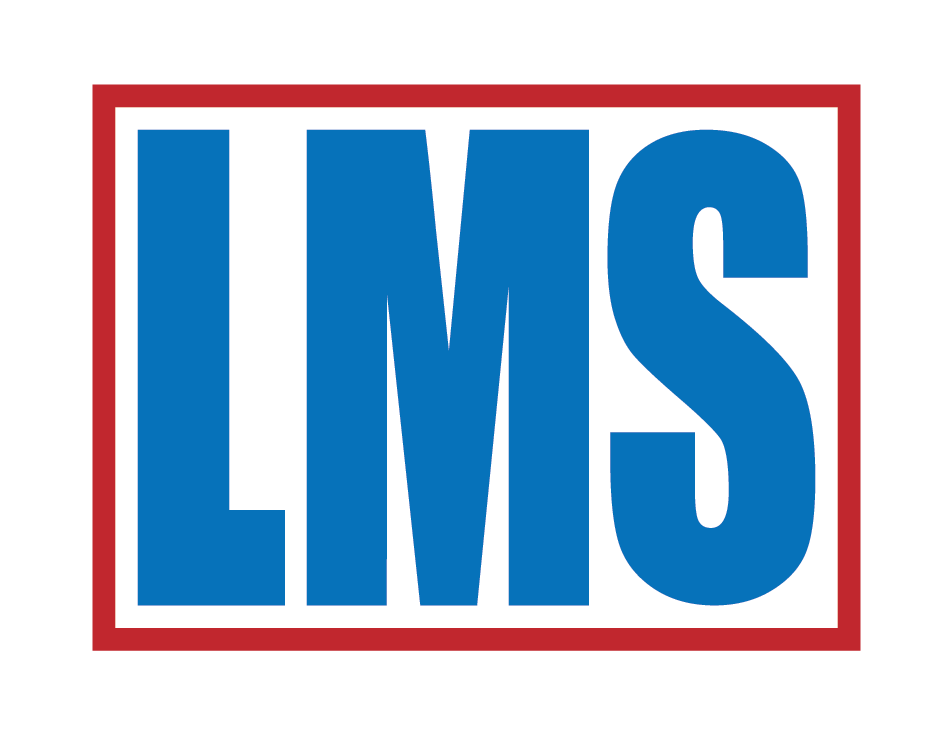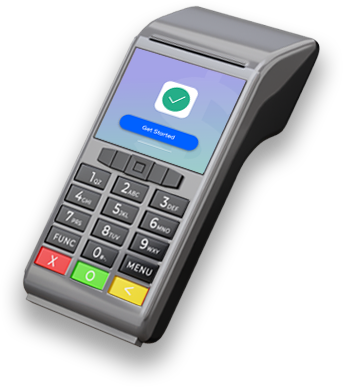Inside this Article
What Are Merchant Account Fees?Most Common Pricing Models for Merchant AccountsUniversal Types of Account FeesHidden Fees To Be Aware OfHow To Reduce Merchant Account Fees6 Best Credit Card Processors for Reduced Merchant Account Fees1. Leaders Merchant Services: Cut Fees With Industry-Low Rates2. Paysafe: Save on Fees With Short-Term Plans3. Stax: Up to 40% Savings for High-Volume Businesses4. Payment Depot: Reduced Fees for Startups and SMEs5. Chase Payment Solutions: Simplified Flat-Rate Pricing With No Hidden Fees6. Sekure Payment Experts: Pay Nothing for POS Equipment and Same-Day FundingThese Are the Best Credit Card Processors for Transparent Account FeesFAQ
What Are Merchant Account Fees?
Merchant account fees are the charges you must pay to accept credit and debit cards. These charges can vary depending on the card, bank, and payment processor used, meaning no two businesses pay the same amount. Although most merchant account fees are non-negotiable, you can purchase additional services and products from your payment processor. Examples include POS equipment, PCI compliance, fraud monitoring, and chargeback protection. Here are a few things that can affect your fees:- Business model: How you reach your customers directly impacts how much you’ll pay in merchant account fees. For example, if you own a brick-and-mortar business and your customers pay in cash, you may pay nothing in transaction fees. However, you’ll pay higher fees for credit card and e-commerce transactions.
- Sales volume: Payment processors will likely offer reduced rates and reasonable discounts if you own a high-volume business. As a low-volume business, you may get access to low-interest loans and free equipment.
- Fraud: High-risk businesses are more susceptible to chargebacks, in which you incur fees every time a customer disputes a transaction. Understanding how much you pay in chargeback fees can help determine whether risk and fraud management add-ons are cost-effective for your business.
Most Common Pricing Models for Merchant Accounts
There are four pricing models that you’re most likely to run into when dealing with credit card processors, including:Flat-Rate Pricing
With flat-rate pricing models, you’ll pay a flat fee on top of a percentage of each transaction. Most merchants pay anywhere from 2.6% – 2.99% with a flat fee of 10¢ – 49¢. However, the percentage markup you’ll pay is susceptible to change, often increasing for online and card-not-present transactions. Flat-rate plans are well-suited to small or recently established businesses due to their transparency and simplicity. Flat-rate pricing may be a good option if you need to know exactly how much you’re paying and don’t want to pay monthly fees.Tiered Pricing
On a tiered pricing plan, the amount you pay per transaction is determined by the type of card your customers use or how you accept each payment. Examples of tiers offered by payment processors include debit cards, credit cards, specialty cards, international cards, or keyed-in, swiped, and card-not-present transactions. Unfortunately, tiered pricing structures are the least transparent and the most difficult to understand. However, if you keep a close eye on the details and are willing to negotiate, tiered pricing can be pretty cost-effective.Interchange-Plus
Interchange-plus pricing plans incorporate card network assessment, variable wholesale interchange fees, and markup. Depending on the card used, your business can save a lot of money – especially for high-volume businesses. Interchange-plus fees start as low as 0.30% + ¢10, considerably lower than tiered and flat-rate pricing plans. You also see what you’ll pay per transaction before opening a merchant account, allowing you to manage your costs more effectively.Zero-Cost
Zero-cost processing is an excellent choice for brick-and-mortar businesses that accept a large number of cash transactions. By choosing a zero-cost pricing plan, you can cut up to 100% of your processing fees by surcharging your cash-paying customers (from 1% – 4%). While you may avoid monthly fees on other pricing plans, zero-cost pricing plans will always charge a monthly fee. The payment processor determines how much you pay, but it can be a cost-effective solution for SMEs, especially restaurants and food trucks.Universal Types of Account Fees
Regardless of the pricing plan you choose, you should expect to see the following fees on your monthly statement:- Authorization fees. When a transaction is processed, an authorization token is sent back and forth between the issuing and acquiring banks to check your customer’s balance. Once completed, the payment will either be accepted or declined. Unfortunately, you’ll pay this fee even if your customer’s card is declined.
- Assessment fees. Usually combined with your interchange fees on your monthly statement, assessment fees are a fee you pay directly to a card issuer. For card issuers like Visa and MasterCard, expect to pay 0.13% – 0.15% per transaction.

Unsure which processor is best for your business?
Take this short quiz and get a tailor-made recommendation in seconds
Unfortunately, transparency isn’t typical among credit card processors, meaning you’ll probably run into hidden merchant account fees. Here are several you should be on the lookout for when choosing a payment processor:
- Chargeback fees. Expect to pay $20 – $100 every time a customer disputes a transaction, whether due to fraud or a merchant refusing to issue a refund. If you operate in a high-risk industry or generate revenue through subscriptions, you’re more likely to run into chargebacks – meaning they can quickly add up.
- PCI compliance fees. You may run into PCI compliance or non-compliance fees (PCI compliance is essentially a security requirement). You can expect to pay up to $120/year for PCI compliance and anywhere from $20 – $44/month for non-compliance. However, many processors offer services to help ensure your business satisfies PCI requirements.
- Monthly minimum fees. Some payment processors charge a monthly fee if your business doesn’t process a minimum number of transactions.
- Cancellation fees. Also called an “early termination fee,” some payment processors will charge you if you close your account before your contract ends.
- Administrative fees. If your payment processor charges you for everything, check your statements for admin fees. These fees include batch processing, creating and printing statements, or offering specialized customer support.
How To Reduce Merchant Account Fees
Although low-risk businesses and brick-and-mortar stores accepting cash will usually get the lowest rates, you can reduce your merchant account fees by carefully choosing a credit card processor. As a starting point, you should look for:- Negotiable rates. Many payment processors allow you to negotiate your transaction fees, allowing you to save a considerable amount.
- Several plans. While searching for a payment processor, only consider those that offer at least interchange plus and zero-cost pricing structures. Most credit card processors offer a variety of plans – but if you aren’t sure, contact a sales team.
- Fraud detection and monitoring. If you’re a high-risk business and don’t want chargebacks to eat into your profits, look for processors that offer free services like a dedicated risk management team or chargeback protection.
- Month-to-month contracts. If you’ve had bad experiences with payment processors, you should look for short-term contracts. You won’t have to pay cancellation fees like you would on a long-term contract.
- Compliance. Failure to comply with the PCI security standard can result in non-compliance fees or fines, but becoming compliant usually also requires a fee. Some processors incorporate PCI compliance or help you obtain it.
6 Best Credit Card Processors for Reduced Merchant Account Fees
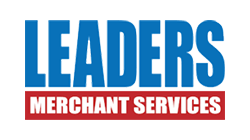
Our Score
Our Score
Negotiable Low Credit Card Processing Rates
Monthly Fee:
$9
Transaction Fee:
From 2% + 0¢
Pricing Model:
Multiple options
Multiple options
This payment processor allows you to choose from two or more different pricing models for paying credit card processing fees. Each model will come with its own advantages and disadvantages, so make sure to consider your options carefully before deciding which is right for your business.
Features and Benefits
- 98% approval rating. If you’re a high-risk business with a low credit score, you still have a strong chance of being accepted and reducing your merchant account fees with LMS.
- Dedicated account manager. LMS offers every new merchant an account manager, so you don’t have to speak to a new representative whenever you need support.
- Numerous payment methods. LMS accepts ACH transfers, Google Pay, Apple Pay, Samsung Pay, and more. Because of this, you don’t have to worry about losing customers due to inadequate processing capabilities.
- Merchant cash advances. If you need extra capital, LMS offers cash advances you can pay back through a small commission on future sales. This means you don’t have the pressure associated with strict deadlines and collateral.
| Accepts in-person & online payments | ✔ |
| Fraud detection & monitoring technology | ✔ |
| Fast payouts | ✔ |
| Transaction fees on cheapest plan | ~2% + 0¢ |
| Monthly fee on cheapest plan | $9.00 |




Our Score
Our Score
Top Global Payment Processor With Industry-Specific Merchant Accounts
Monthly Fee:
$16
Transaction Fee:
From 0.99% + 25¢
Pricing Model:
Multiple options
Multiple options
This payment processor allows you to choose from two or more different pricing models for paying credit card processing fees. Each model will come with its own advantages and disadvantages, so make sure to consider your options carefully before deciding which is right for your business.
Features and Benefits
- Free equipment. Every merchant gets a free mobile card reader and access to the Paysafe Mobile Pay app, allowing you to turn your iPhone or Android device into a POS terminal.
- All-in-one dashboard. Paysafe allows you to track and monitor your transactions, take orders through a virtual terminal, generate reports, and process refunds.
- Payment gateway. Paysafe provides access to Authorize.Net, which lets you accept payments online. Its advanced API allows you to integrate your checkout page directly onto your website without compromising your gateway’s security protocols.
- Fast payouts. You’ll get your funds in 1-2 business days, completely free of charge, which isn’t common among credit card processors. If you require your funds even faster, you can pay extra for guaranteed next-day funding.
| Accepts in-person & online payments | ✔ |
| Fraud detection & monitoring technology | ✔ |
| Fast payouts | ✔ |
| Transaction fees on cheapest plan | $0 (1%-4% surcharge to customers) |
| Monthly fee on cheapest plan | $16.00 |
3. Stax: Up to 40% Savings for High-Volume Businesses


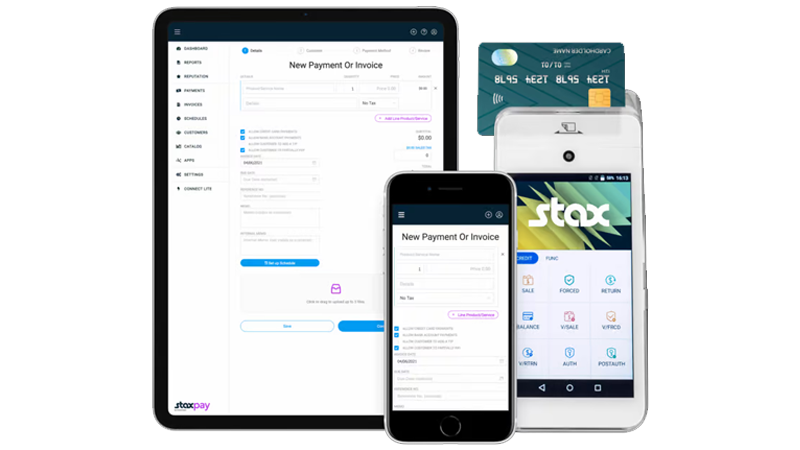

Our Score
Our Score
Save Up to 40% on Credit Card Processing Fees
Monthly Fee:
From $99
Transaction Fee:
From 0% + 10¢
Pricing Model:
Subscription
Subscription
With subscription-style pricing, you’ll pay a fixed monthly fee instead of a percentage-based markup on each credit and debit card transaction. While this will considerably reduce your per-transaction fees, you’ll typically still pay a small flat fee on each transaction. This amount is unaffected by the variable interchange fees charged by the different card networks (e.g. Visa, Mastercard), helping to keep your payment processing fees more predictable.
Features and Benefits
- Top-tier support. With live chat, email, web form/ticket, and phone support, Stax can help you understand and cut your merchant fees – even outside standard business hours.
- Built-in e-commerce protection. In addition to integrating with the most popular e-commerce platforms, Stax prevents chargebacks by instantly validating customer information and offering fraud protection.
- Hardware compatibility.When switching to Stax, there’s no need to purchase new hardware, as it integrates with over 90% of third-party POS systems.
- QuickBooks. Thanks to Stax’s integration with QuickBooks, you can sync your data in real time and keep track of your payments, customers, invoices, and products.
| Accepts in-person & online payments | ✔ |
| Fraud detection & monitoring technology | ✔ |
| Fast payouts | ✔ |
| Transaction fees on cheapest plan | 0% + 10¢ (online) |
| Monthly fee on cheapest plan | $99.00 |
4. Payment Depot: Reduced Fees for Startups and SMEs
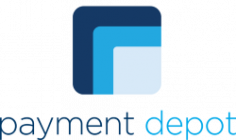

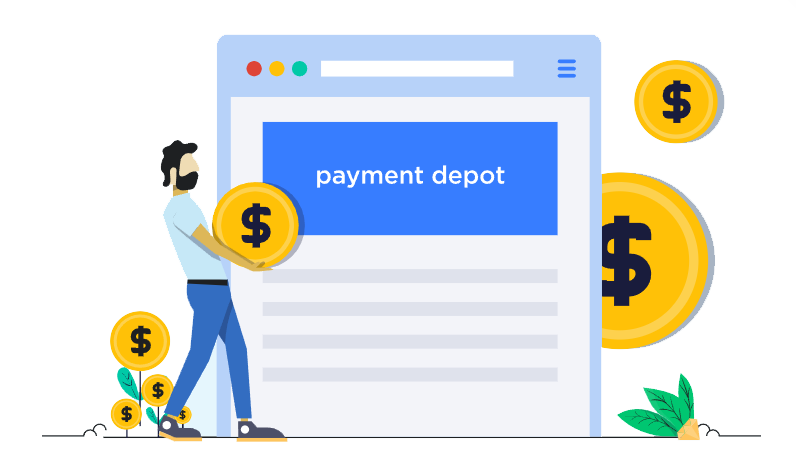

Our Score
Our Score
Excellent Customer Service Backed by a Dedicated Risk Monitoring Team
Monthly Fee:
From $79
Transaction Fee:
From 0% + 10¢
Pricing Model:
Subscription
Subscription
With subscription-style pricing, you’ll pay a fixed monthly fee instead of a percentage-based markup on each credit and debit card transaction. While this will considerably reduce your per-transaction fees, you’ll typically still pay a small flat fee on each transaction. This amount is unaffected by the variable interchange fees charged by the different card networks (e.g. Visa, Mastercard), helping to keep your payment processing fees more predictable.
Features and Benefits
- Payer verification. Payment Depot automatically verifies your customers’ information every time they purchase through your online store, significantly reducing the chances of merchant account fees like chargebacks.
- 24/7 support. If you need technical support, you can contact Payment Depot’s support team 24/7. For sales and general inquiries, you can contact them from 8:30 a.m. to 7:30 p.m. EST & PST.
- Next-day payouts. You’ll receive your funds within a business day at no additional cost, a not-so-common practice among credit card processors.
- Fast onboarding. As long as you have the required information, you can receive online and in-person payments in as little as 24 hours without any setup fees.
| Accepts in-person & online payments | ✔ |
| Fraud detection & monitoring technology | ✔ |
| Fast payouts | ✔ |
| Transaction fees on cheapest plan | 0.2%-1.95% |
| Monthly fee on cheapest plan | $0 |
5. Chase Payment Solutions: Simplified Flat-Rate Pricing With No Hidden Fees
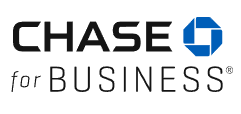



Our Score
Our Score
Favorable Flat Rate Pricing & E-Commerce Features for SMEs
Monthly Fee:
$0
Transaction Fee:
From 2.6% + 10¢
Pricing Model:
Flat rate
Flat rate
Flat rate pricing simplifies your payment processing bill by charging the same percentage markup on every credit or debit card transaction you receive. The payment processor still pays the variable interchange fee set by the card network (e.g. Visa, Mastercard) on each transaction, but you always pay the same fixed rate regardless.
Features and Benefits
- Zero liability protection. As long as you’re compliant with data security standards and report unauthorized transactions quickly, you won’t have to worry about losing money, as Chase will reimburse you.
- Authorize.net. Chase integrates seamlessly with Authorize.net. You can take advantage of Authorize.net’s security plus the ease of use and speed that comes with Chase.
- Specialized software. For an added fee, Chase offers 10+ industry-specific software tools that you can use to manage your business more efficiently. Examples include Fiskl (finance management), Eventzilla (events and marketing platform), and PayRent.
- Payment options. Chase allows you to reach more customers by accepting debit cards, credit cards, ACH transfers, digital wallets, and more.
| Accepts in-person & online payments | ✔ |
| Fraud detection & monitoring technology | ✔ |
| Fast payouts | ✔ |
| Transaction fees on cheapest plan | 2.6% + 10¢ |
| Monthly fee on cheapest plan | N/A |
6. Sekure Payment Experts: Pay Nothing for POS Equipment and Same-Day Funding


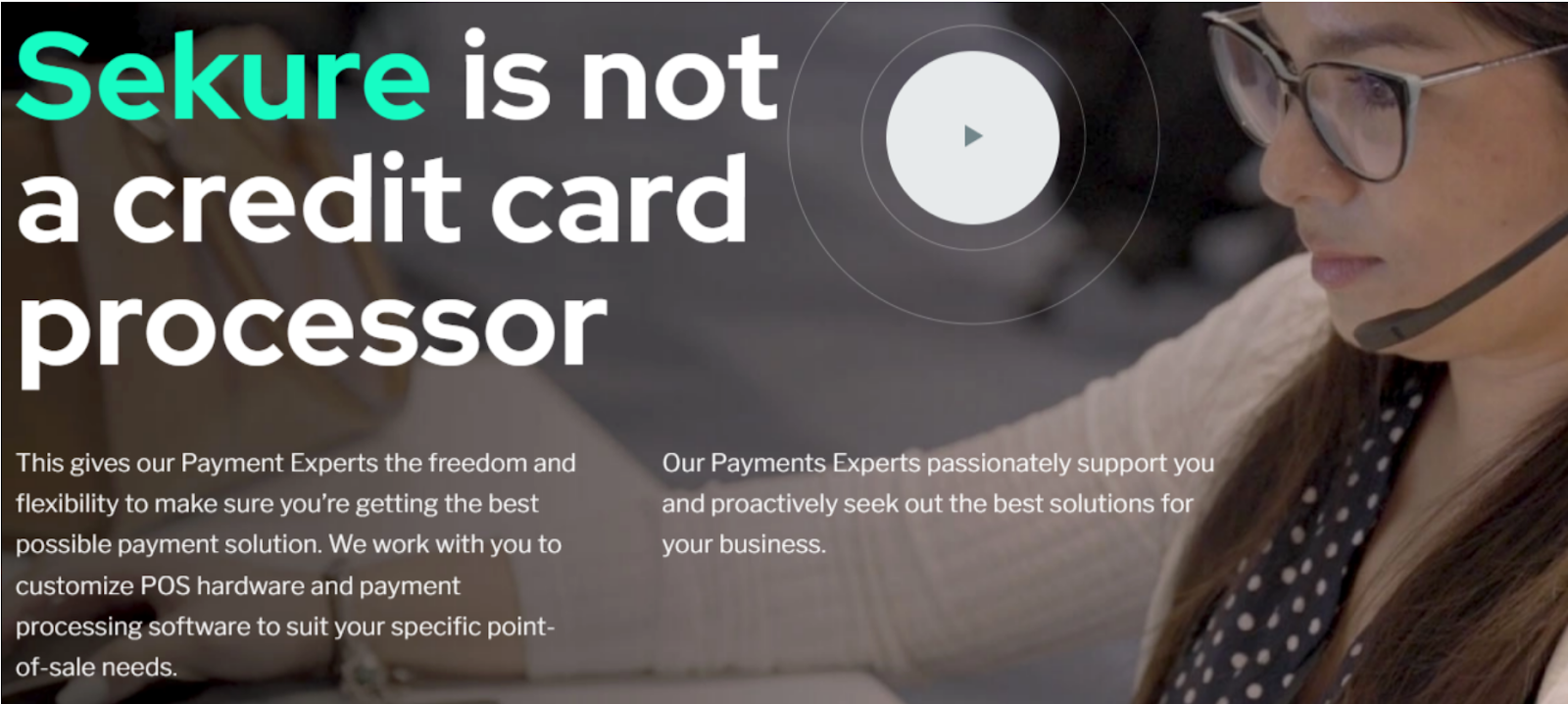

Our Score
Our Score
Save up to 100% on Your Processing Costs With the Edge Program
Monthly Fee:
From $0
Transaction Fee:
From 0%
Pricing Model:
Multiple options
Multiple options
This payment processor allows you to choose from two or more different pricing models for paying credit card processing fees. Each model will come with its own advantages and disadvantages, so make sure to consider your options carefully before deciding which is right for your business.
Features and Benefits
- Fraud prevention. All of Sekure’s partner POS systems and e-commerce providers verify your customers’ information and decline suspicious transactions, protecting your business from fraudulent activity and potential chargebacks.
- Dedicated chargeback team. Sekure’s team is there to assist you in fighting chargebacks, making it much more likely for you to win disputes.
- Personal payment experts. Free up time with the help of experts with specialized, industry-specific expertise who can show you how to navigate credit card processing.
- Personalized savings analysis. If you’re using a different payment processor, you can share your monthly statement with Sekure. They will then assess your fees and search for a better deal through their partner network.
| Accepts in-person & online payments | ✔ |
| Fraud detection & monitoring technology | ✔ |
| Fast payouts | ✔ |
| Transaction fees on cheapest plan | 0% (4% passed to customer) |
| Monthly fee on cheapest plan | $39.95 |
These Are the Best Credit Card Processors for Transparent Account Fees
Having a less-than-thorough understanding of merchant account fees can eat into your profits. To help reduce the burden, you need a transparent payment processor offering competitive interchange rates, zero-cost plans, free equipment, negotiable contracts, and more. If you’re a startup or SME, I recommend Leaders Merchant Services. It offers industry-low and negotiable rates, free POS hardware for in-person payments, and fraud detection technology for online payments through Auhorize.net. If you’re a low-volume business selling highly-priced items, Paysafe is an excellent choice. In addition, Paysafe has a zero-cost processing plan, a dedicated risk management team, and support for over 250 local and international payment methods. Pick Stax if you’re a high-volume business. Stax can save you up to 40% on merchant account fees with its subscription-based pricing model. To help you make an informed decision, I created a comparison table:| Best Feature | Best For | Monthly fee on cheapest plan |
Transaction fees on cheapest plan |
||
| Leaders Merchant Services |
Industry-low rates and negotiable pricing to cut merchant account fees |
Recently established businesses and SMEs |
$9.00 | ~2% + 0¢ | |
| Paysafe | Save on account fees with no long-term plans or cancellation fees |
Low-volume businesses selling high-value products and services |
$16.00 | $0 (1%-4% surcharge to customers) | |
| Stax | Save up to 40% on your merchant account fees |
High-volume businesses, especially in e-commerce |
$99.00 | 0% + 10¢ (in-person) | |
| Payment Depot |
No markups or cancellation fees |
SMEs processing less than $150,000 per year |
$0 | 0.2%-1.95% | |
| Chase Payment Solutions |
Simplified flat-rate pricing and same-day funding |
Online and in-person businesses that can maintain a $2,000 daily balance |
N/A | 2.6% + 10¢ | |
| Sekure Payment Experts |
Custom merchant account solution plus free POS equipment |
New businesses looking for a tailored payment solution |
$39.95 | 0% (4% passed to customer) |














